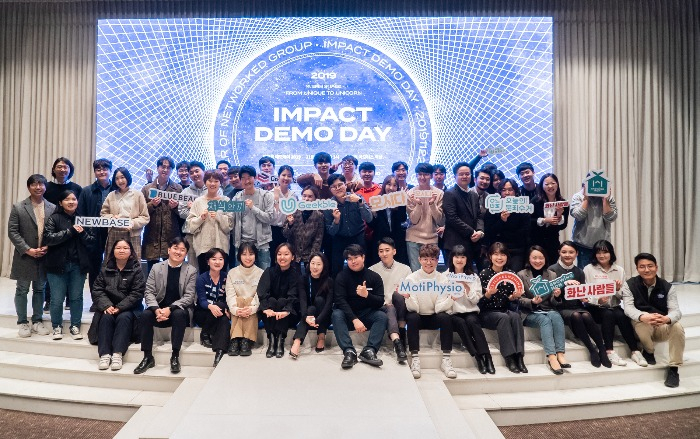Blurring lines between accelerators and VCs with record fundings
Thanks to robust startup scene, Korean accelerators expand their investement amount and prepare to go public
By Feb 14, 2022 (Gmt+09:00)
Deutsche Bank's Korea IB head quits after country head resigns


Macquarie Korea Asset Management confirms two nominees


Hanwha buys SŌĆÖpore Dyna-MacŌĆÖs stake for $73.8 mn from Keppel


Korea's Taeyoung to sell local hotel to speed up debt workout


Meritz leaves door open for an M&A, to stay shareholder friendly



Sopoong Ventures Corp. is poised to create a fund worth 10 billion won ($8 million) that specializes in early stage investment, industry insiders said.┬Ā
Accelerators typically provide a lower amount of investment than venture capital firms. Taking that into consideration, the market view is that the 10 billion won funding size is unusually high.┬Ā
Only two other South Korean accelerators have created funds worth 10 billion won or more; namely FuturePlay founded by the prestigious KAIST (Korea Advanced Institute of Science and Technology) graduates and Bluepoint Partners, also headed by a KAIST graduate.┬Ā
Last year, Sopoong Ventures created three new funds and grew its AUM (assets under management) to roughly 10 billion won. This year starts with a bang for Sopoong, with the first funding round by itself projected to be worth 10 billion won.┬Ā
AUM refers to the total market value of the assets a company manages at a given point in time. The figure is inclusive of the returns a fund has made on its investment and the capital it has at disposal to make new investments.

Sopoong is not alone in the rapid growth of its funds.┬Ā
Bluepoint PartnersŌĆÖ new investment amount for 2020 stood at 8.5 billion won. Last year, the figure jumped 2.5 fold to 20.9 billion won.┬Ā
The total corporate value of its invested companies stood at 1.5 trillion won, which doubled to 3.2 trillion last year.┬Ā
FuturePlay also saw its AUM exceed the 100 billion won mark, more than double that of the yera prior. The total corporate value of invested companies surged 83% on-year to 3.3 trillion won in 2021.
Not surprisingly, the amount of investment per project also rose significantly to exceed 1 billion won, which used to hover around tens of millions.┬Ā
For instance, FuturePlay invested 1.8 billion won in a mobility startup and 1.5 billion won in a healthcare startup so far this year.┬Ā
Sopoong Ventures invested an average of 90 million won per project in 2020 but increased that figure to 1.7 trillion won last year.┬Ā
Another expansion for the accelerators is that they have begun funding past Series A ŌĆō diverting from the convention of focusing their interests in Seed to Pre-Series A stages.┬Ā
The rapid expansion of acceleratorsŌĆÖ funding comes on the back of the bullish market sentiment in the startup scene. Total new investment in startups recorded 7.7 trillion won last year, hitting record highs for two years straight.┬Ā
Startup Alliance Korea said last yearŌĆÖs 548 new investments each amounted to less than a billion won, excluding the ones whose amount remain undisclosed.┬Ā
ŌĆ£Looking at the investment amount, funding for early stage startups is so active that it almost blurs the line between an accelerator and a VC,ŌĆØ an industry insider told The Korea Economic Daily.┬Ā
Industry insiders say early stage startups desperately need managerial assistance, which increases the value of accelerators that provide such support.
Accelerators often provide customized assistance such as mentorship, legal counsel, and demo day to invested companies, in addition to the financial support. They also work with conglomerates in discovering and jointly investing in new startups.┬Ā
An industry insider said, ŌĆ£Startups at the very early stage, say a team of three or five people, have high demand for accelerators to help them from the onset of incorporation.ŌĆØ
ŌĆ£While accelerators in the past focused their efforts on individual advice to startups, the widespread perception now is that accelerator heavyweights provide systematic assistance rather than personal anecdotes,ŌĆØ the expert added.┬Ā
On the back of the rise in the acceleratorsŌĆÖ financial clout, some are slated to go public.┬Ā
FuturePlay and Bluepoint Partners are looking to get listed on Kosdaq this year. A lesser known accelerator named CNTTech is expected to follow suit.┬Ā
Write to Jong-Woo Kim at jongwoo@hankyung.com
Jee Abbey Lee edited this article.
-
 Foreign investmentsSeoul launches investment promotion agency for FDI expansion
Foreign investmentsSeoul launches investment promotion agency for FDI expansionFeb 07, 2022 (Gmt+09:00)
2 Min read -

-

-
 Venture CapitalPipeline software solutions provider Cloa wins $5.1 mn in additional funding
Venture CapitalPipeline software solutions provider Cloa wins $5.1 mn in additional fundingDec 29, 2021 (Gmt+09:00)
1 Min read -
 Venture CapitalMobile POS maker Payhere receives $84.2 mn in Series A funding┬Ā
Venture CapitalMobile POS maker Payhere receives $84.2 mn in Series A funding┬ĀDec 28, 2021 (Gmt+09:00)
2 Min read -
 Artificial intelligenceEx-quant developer on a mission to save traders microseconds
Artificial intelligenceEx-quant developer on a mission to save traders microsecondsDec 06, 2021 (Gmt+09:00)
3 Min read -
 Startups, Venture CapitalHomegrown VCs turn to Korean American startups in search of unicorns
Startups, Venture CapitalHomegrown VCs turn to Korean American startups in search of unicornsNov 25, 2021 (Gmt+09:00)
3 Min read


